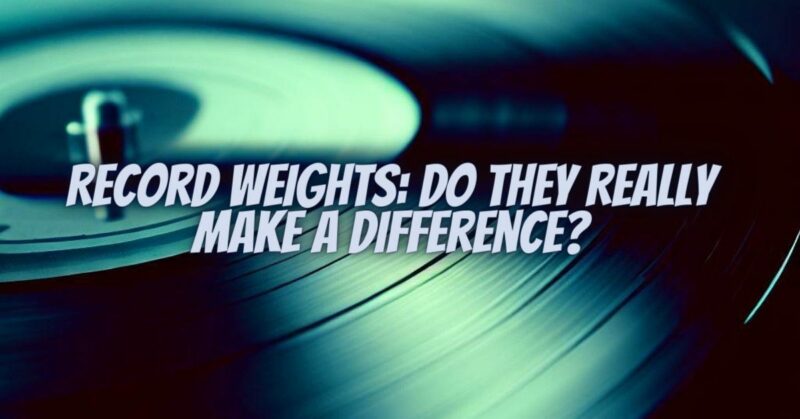Vinyl records, with their warm analog sound and tactile appeal, continue to captivate audiophiles and music enthusiasts worldwide. To extract the best possible sound from your vinyl collection, many accessories and gadgets are available, and one such accessory often discussed is the record weight. But the question remains: Do record weights really make a difference, or are they just another audiophile gimmick? In this comprehensive article, we will explore the purpose of record weights, how they work, their potential benefits, and whether they are worth the investment for vinyl enthusiasts.
The Purpose of Record Weights
Record weights, also known as record clamps or record stabilizers, are heavy objects, often made of metal or other dense materials, designed to sit on top of a vinyl record during playback. Their primary purpose is to flatten the record and create better contact between the record and the turntable platter. This, in turn, aims to address various playback issues and enhance the overall listening experience.
Potential Benefits of Using Record Weights
- Reducing Warping: Vinyl records can develop slight warps over time, which can cause tracking issues and affect sound quality. Record weights help to flatten the record and minimize warping, allowing for smoother playback.
- Improved Contact: By pressing the record firmly onto the turntable platter, record weights improve the contact between the stylus and the groove, potentially reducing vibrations and resonance that can lead to distortion.
- Minimizing Vinyl Bounce: During playback, vibrations from the speakers and other sources can cause the record to bounce slightly on the turntable. Record weights can dampen these vibrations, resulting in a more stable and consistent playback.
- Reduced Wow and Flutter: Wow and flutter are speed variations that can occur in turntables, leading to pitch inconsistencies. Record weights may help reduce these variations by adding extra mass to the system.
- Enhanced Bass Response: Some vinyl enthusiasts claim that record weights can improve bass response by reducing unwanted vibrations and resonances, resulting in tighter and more defined low frequencies.
Do Record Weights Really Make a Difference?
The effectiveness of record weights in improving audio quality can vary depending on several factors:
- Turntable and Tonearm Quality: High-end turntables with well-designed tonearms and platters may benefit less from record weights, as they already offer stable and precise playback.
- Record Condition: Record weights may have a more noticeable impact on warped or slightly uneven records. For pristine, flat records, the difference may be minimal.
- Listening Environment: The impact of record weights can also depend on the listening environment. In acoustically treated rooms with minimal vibrations, their effects may be less noticeable.
- Subjective Listening: As with many audiophile enhancements, the perceived difference in sound quality when using record weights is subjective. Some listeners report significant improvements, while others may not notice a substantial change.
Record weights have a legitimate purpose in vinyl playback. They can help reduce warping, improve contact between the record and the turntable, and potentially enhance sound quality, especially for records with minor imperfections. However, the degree to which record weights make a difference can vary widely based on your equipment, the condition of your records, and your listening environment. Whether they are worth the investment ultimately comes down to personal preference and how much you value the potential improvements they offer. If you are a dedicated vinyl enthusiast seeking to optimize your setup, experimenting with a record weight may be a worthwhile endeavor, but casual listeners may not find them essential to their vinyl experience.


